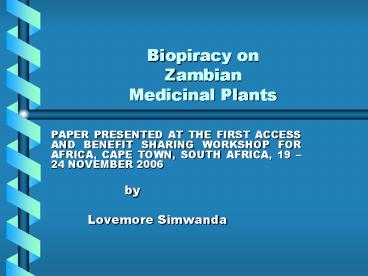Biopiracy on Zambian Medicinal Plants - PowerPoint PPT Presentation
Title:
Biopiracy on Zambian Medicinal Plants
Description:
Biopiracy on Zambian Medicinal Plants PAPER PRESENTED AT THE FIRST ACCESS AND BENEFIT SHARING WORKSHOP FOR AFRICA, CAPE TOWN, SOUTH AFRICA, 19 24 NOVEMBER 2006 – PowerPoint PPT presentation
Number of Views:92
Avg rating:3.0/5.0
Title: Biopiracy on Zambian Medicinal Plants
1
Biopiracy on Zambian Medicinal Plants
- PAPER PRESENTED AT THE FIRST ACCESS AND BENEFIT
SHARING WORKSHOP FOR AFRICA, CAPE TOWN, SOUTH
AFRICA, 19 24 NOVEMBER 2006 - by
- Lovemore Simwanda
2
Structure of the Presentation
- Background
- Name and Type of Genetic Material
- Actors involved
- How the Genetic Resource is Used
- Type/Kind of ABS Agreements
- Lessons learnt
- Agreed Benefits in the Agreements
- Benefits Realised to Date
- Direct Contribution to Poverty Alleviation
- Changes needed at the local, national and /or
International Levels - Conclusions
3
Background
- Zambia human capital formation that is necessary
to generate sustained economic growth is impeded
not only by lack of adequate social sector
expenditures but by high incidence of HIV/AIDS - Sixteen percent of the adult population aged 15
years and 49 years inclusive is stricken by this
disease and related opportunistic infections - Consequently this impedes the country's capacity
to develop by shortening human productivity and
life expectancy - Zambia has abandant medicinal plants in its major
natural miombo vegetation
4
Background Ctd
- Zambian traditional medicine plays an important
and vital role in most parts of the country given
the fact that adequate modern health facilities
are lacking. - General ailments are treated locally at
household level and most households depend on
traditonal medicine knowledge available within
their reach - The traditional knowledge on the use of medicinal
plants has been orally passed on through the
several generations.
5
Name and Type of Genetic Material
- Several medicinal plant genetic materials (actual
names withheld) - Medicinal Plant Biological/Gentic are under
threat by external collectors operations who come
under a number of ventures and at times digise
themselves through legitiimate social
institutions.
6
Actors involved
- Traditional Healers Practioners Association of
Zambia (THPAZ) - Ministry of Health
- National Aids Council of Zambia (NAC)
- Forestry Department
- Environmental Conservation Association of Zambia
(ECAZ)
7
How the Genetic Resource is Used
- The Plant Genetic Resources are used for
medicinal purposess especially those plant
genetic material that have been associated with
blood boasting and immunity enhancement, curing
of HIV/AIDS - The Biopiracy agents tend to visit the suspected
patients being treated with the same plant
genetic material - unsuspecting patient or gardian give out the
information without any reservations
8
Type/Kind of ABS Agreements
- There are no proper agreements in place with the
foreign collectors - foreign collectors come into the country as
people working on humanitarian programmes e.g
addressing Health, hunger, unemployment through
the promotion of agriculture activities, poverty
alleviation etc. - Foreign collectors initially develop some local
relationships with some local traditional healers - Later become members of the local Traditional
Healers Practitioners Association of Zambia - Through paying a membership fee, a certificate is
issued
9
Lessons learnt
- Loss of control of biological/genetic resources
and accompanying TK - Biopiracy denies the country as well as the local
communities fair and equitable benefits resulting
from the commercialisations of their biological
resources and TK - Lack of respect and recognition of the
contribution of local communities in selection or
identifying genetic potential of biological
resources. - Privatization also Leads to monopolistic control
of natural resources and deny community access to
most critical elements of human survival such as
health and food.
10
Lessons Learnt Ctd
- Lack of legal framework on ABS in line with the
CBD and ITPGRFA - Lack of domestication of international treaties
such as CBD and ITPGRFA etc. - Fragmented institutions such as govt ministries
regulating ABS - Poorly organised structures on local communities
- Poverty in most local African communities which
may impact on the way they may grant access to
genetic resources - Govt. interference in ABS
- Lack of priority on the legal reform on ABS
- Lack of resources and political will
- Lack of public awareness and education on the
actual and potential value of biodiversity.
11
Agreed Benefits in the Agreements
- There is none so far.
- Only through the membership fees paid to THPAZ of
150.0 per year or 250.0 per five years and a
membership certificate is issued. - Benefits Realised to Date None
- Direct Contribution to Poverty Alleviation None
12
Changes needed at the local, national and /or
International Levels
- Need to control access to biological/genetic
resources and Traditional Knowledge through the
introduction of appropriate legislation and
establishment of institutional structures. - Need to increase public appreciation, education
and awareness of the value and importance of
biodiversity, and public involvement in its
conservation and sustainable use. - Need to take audit /document the
biological/genetic resources and Indigenous
knowledge.
13
Conclusion
- Biopiracy if not stopped, will continue to erode
the biological/genetic resources of the
developing countries as well as denying them fair
and equitable benefits derived from their losses. - There is need to strengthen the policy,
institutional and legal frameworks in the
developing countries particularly those in
Southern Africa which to date have no national
legislation on ABS. - ABS legal regime should be flexible and tailored
made to a particular countrys needs. - There is need to urgently formulate ABS
legislation for Zambia in line with the CBD and
ITPGRFA. - Use of the Capacity Building Training Module on
Policy and Law for Biological/Genetic Resources
14
END OF PRESENTATION
- THANK YOU!






























